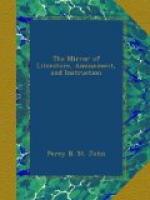[1] Sabling of the Germans.
Naturalization of Fish.
Hal. At Lintz, on the Danube, I could have given you a fish dinner of a different description, which you might have liked as a variety. The four kinds of perch, the spiegil carpfen, and the siluris glanis; all good fish, and which I am sorry we have not in England, where I doubt not they might be easily naturalized, and where they would form an admirable addition to the table in inland counties. Since England has become Protestant, the cultivation of fresh water fish has been much neglected. The burbot, or lotte, which already exists in some of the streams tributary to the Trent, and which is a most admirable fish, might be diffused without much difficulty; and nothing could be more easy than to naturalize the spiegil carpfen and siluris; and I see no reason why the perca lucio perca and zingil should not succeed in some of our clear lakes and ponds, which abound in coarse fish. The new Zoological Society, I hope, will attempt something of this kind; and it will be a better object than introducing birds and beasts of prey—though I have no objection to any sources of rational amusement or philosophical curiosity.
Conveying Fish.
Phys.—In Austria, the art of carrying and keeping fish is better understood than in England. Every inn has a box containing grayling, trout, carp, or char, into which water from a spring runs; and no one thinks of carrying or sending dead fish for a dinner. A fish-barrel full of cool water, which is replenished at every fresh source amongst these mountains, is carried on the shoulders of the fisherman. And the fish, when confined in wells, are fed with bullock’s liver, cut into fine pieces, so that they are often in better season in the tank or stew than when they were taken. I have seen trout, grayling, and char even, feed voraciously, and take their food almost from the hand. These methods of carrying and preserving fish have, I believe, been adopted from the monastic establishments. At Admondt, in Styria, attached to the magnificent monastery of that name, are abundant ponds and reservoirs for every species of fresh water fish; and the char, grayling, and trout are preserved in different waters— covered, enclosed, and under lock and key.
* * * * *
SPIRIT OF THE PUBLIC JOURNALS.
* * * * *




